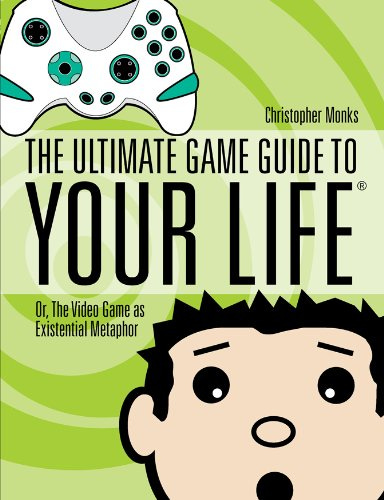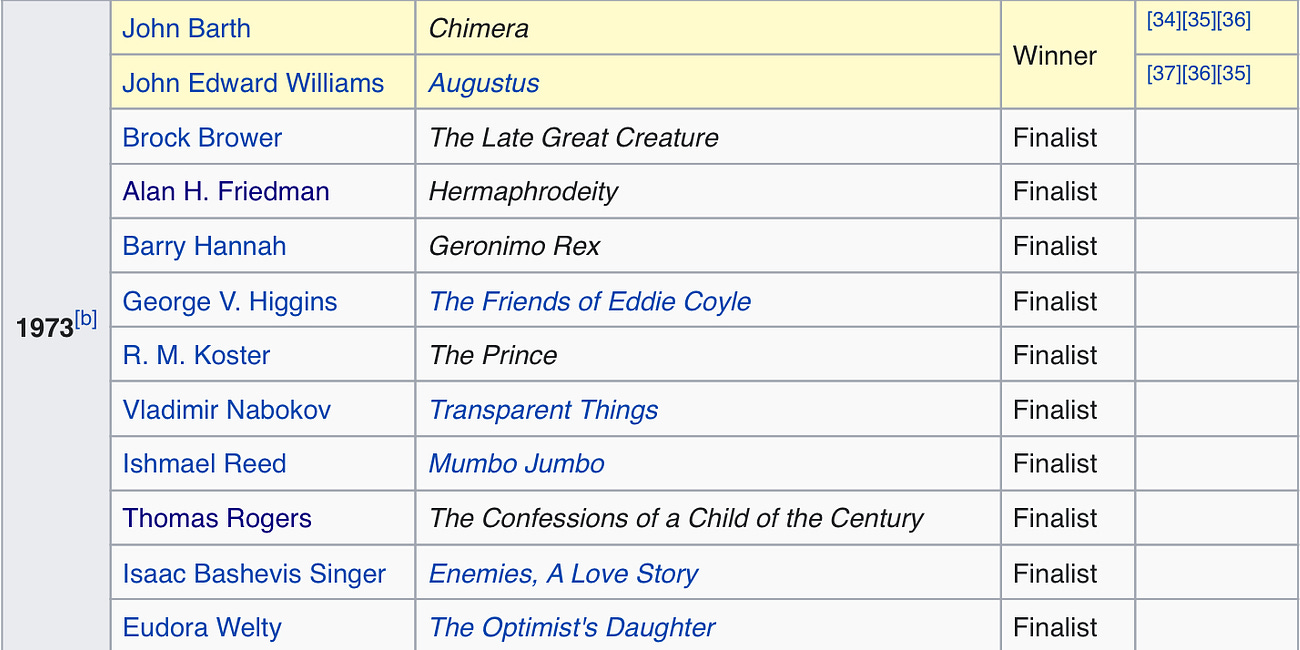Better to be Forgotten Than Disposable
Most books are forgotten, but that doesn't mean they didn't matter.
The vast majority of published books are destined to be forgotten.
A book’s lack of quality is rarely the chief reason. There’s millions of great books that have been published and are now almost entirely unremembered.
I feel this acutely as the author of several out-of-print books.
My novel, The Funny Man, is also out of print, having sold in very small numbers and not meeting the threshold necessary to even keep any copies in storage. For years I thought it was because it might not have been a good book, and then I re-read it (through parted fingers) during the pandemic and realized it’s actually really quite good (modesty aside). I would say it deserved a better fate except I find impossible to know what any book “deserves.” Most books probably deserve a better fate than what they receive.
I know for a fact that the book pictured below by Chris Monks (the longtime editor of McSweeney’s Internet Tendency) is a kind of masterpiece because I edited it as part of an eponymous humor imprint (TOW Books1) that is also gone and almost entirely forgotten.
Chris’s book is structured as one of those old-school video game walk-through manuals that were sold as an aid to help you navigate open-world video games. The book is undoubtedly clever and funny, and if someone made an actual game from it, it would be an amazing thing, but it is also a deep meditation on what a life consists of from birth to death.
The final game “challenge,” of the book, Challenge Twenty-Eight: Your Death, is, no joke, profoundly emotionally moving to the point that it chokes me up. When Chris first turned in the manuscript (which was about twice the length of the final published version), I told him that it was far too good for the imprint, that he had created something of lasting value that I was very proud to be able to have helped shepherd into the world.
I don’t know how many copies of The Ultimate Game Guide to Your Life still exist in the world. I have maybe five of them. It looks like you can pick up used copies here and there, and I assume Chris has some too. The Ultimate Game Guide to Your Life will be forgotten not because it wasn’t good but because it was published by an imprint operating under the umbrella of a company that was struggling, and after earlier books from the imprint hadn’t sold all that well, while also coming out in the midst of a global recession.
It didn’t have a chance, which is a shame, but also not unexpected. I’m glad at least that I got to read it, and I hope Chris is glad that he got to write it, just as I’m glad to have written all of my out-of-print books.
The point of putting books into the world isn’t to be forever immortalized. At least I don’t think that way. I’m not sure there is a larger point beyond simply engaging in the activity itself.
I wish I could explain this to the people who claim that AI is somehow a way to “democratize” the making of art by giving people who cannot write or compose or draw or sing or play an instrument access to tools of automation that eliminate the process of making the thing.
It’s the making that’s the art. Without the making, you don’t have anything meaningful.
Or maybe it’s not art, but it still matters. Every Tuesday evening for the last four months I’ve been getting together with my fellow learners in the adult program of my local School of Rock and we play Rolling Stones songs. Is this good music? Ehhh… Is it art? Definitely not.
Is it good effing fun? Absolutely. Do we finish playing a song sometimes and kind of grin and nod at each other like…that felt good, didn’t it? We do. Are we delusional? Maybe. Does it matter if we’re delusional?
No.
As I wrote in a previous newsletter last year, our goal is to make things that are “non-disposable.” Now, the gap between “important and enduring” and “non-disposable” is vast. The non-disposability of something is really rooted in the intent and process behind the doing as much as anything else. The end result may not be great or even good, but if the attempt is genuine, we have something that deserves at least some of our attention and is therefore non-disposable.
The real challenge these days is that we are living through a rising-tide of absolutely disposable content, much of it generated by AI. The most recent episode of the Ezra Klein Show in which Klein and his guest, tech journalist, Nilay Patel discuss the ramifications of an internet already saturated in worthless garbage being further inundated with AI-generated content suggests the whatever utility the internet has for users will be utterly destroyed with the content equivalent of packing peanuts.
A further challenge is that some people look at this clearly disposable crap and marveling at it as though it heralds some kind of breakthrough in creativity. Perhaps you have seen the latest mind-blower, Suno.AI, which in seconds allows you to make a song about anything. It’s very cool, and it is amazing that we have a technology that can do this, but every single thing it produces is the very definition of disposable.
The Suno.AI output is clearly superior from a technical standpoint to what most of us could produce, musically, but who cares? It is not a form of creativity. It is pointless to evaluate it in terms of its aesthetics. It doesn’t even rise to the status of something that could one day be forgotten. Really, it doesn’t even exist.
In October 2022, I wrote about my “discovery” of a forgotten author and book, Thomas Rogers and his novel The Confession of a Child of the Century, which had been a National Book Award finalist in 1973, but has long been out of print. The book is a masterpiece, truly, and the idea that this novel could have largely disappeared from the public awareness is mind boggling.
But like I said, the destiny of most books from the moment they’re published is to be forgotten.
But if you make something non-disposable, you never know when it might one day be re-discovered.
Links
Not coincidentally, my Chicago Tribune column this week is about how I forgot about Charles Wright’s The Wig, one of my favorite books, and what I did to make sure I’d never forget it again.
The long list for the VCU Cabell First Novelist Award was announced. I have read none of these books, which feels like a serious oversight on my part.
The Millions has issued its big Spring Books Preview. Lots of very tempting titles here.
Fascinating look at the rejection letters Toni Morrison sent out when she was an editor at Random House.
John Barth, one of the true giants of postmodern literature passed away last week at the age of 93. I’ll have a reflection on Barth’s work in the Chicago Tribune next week. Maryse Conde, the “grand dame of francophone literature” also passed away last week at age 89.
This week’s pick from McSweeney’s, another piece of satire that hits the target a little close to home: “The Only Way to Save Public Education Is to Turn Every Single School in America into High-End Condos.”
Recommendations
1. Black AF History by Michael Harriet
2. Nona the Ninth by Tasmyn Muir
3. Liberation Day by George Saunders
4. Atonement by Ian McEwan
5. The Marriage Plot by Jeffrey Eugenides
Aaron A. - Reistersown, MD
At some point I’m going to do a full post of books I think are great, but also are in the process of being forgotten, and one of them might be Being Dead by Jim Crace, which is my recommendation for Aaron.
1. The Namesake by Jhumpa Lahiri
2. Martyr by Kavir Akbar
3. Brooklyn by Colm Toibin
4. James by Percival Everett
5. Ancillary Justice by Ann Leckie
Randall V.
For Randall, I’m recommending Let the Great World Spin by Colum McCann.
1. The Good Kill by Marc Livecche
2. White Noise by Don DeLillo
3. The Plague by Albert Camus
4. Understanding Media by Marshall McLuhan
5. The Labors of Hercules by Agatha Christie
Chris K. - Buena Vista, CO
How about some classic mid-career John Irving for Chris? The Cider House Rules.
So what do you think, am I taking too hard a line on AI-generated content in terms of believing that it is inherently disposable and not worthy of consideration on its own aesthetic merits? I just turned 54 this week, so maybe I’ve officially entered my old crank phase.
Since turning in my book manuscript I’ve read more books in the last two weeks than I did the first three months of the year, and while nothing has been so great that I feel compelled to tell people about it, having the chance to relax into reading again has been fantastic.
I hope you reading is going just as well as mine.
Until next time…
JW
The Biblioracle
TOW stands for “The Original Warner.”






Just sent this article to my wife who works at the online department of an art school. Almost all discussion from work is now what the hell are artists going to do when AI takes over their lives? As a comic book guy almost all the discussion is what happens when the idiots at Marvel/DC get AI to take over our lives. Creators are scared shitless about the future. Thank you for being a small island of sanity in the world.
As I read, I kept picturing my high school yearbooks and that classic "math equation":
2 Good
2 Be
4 Gotten